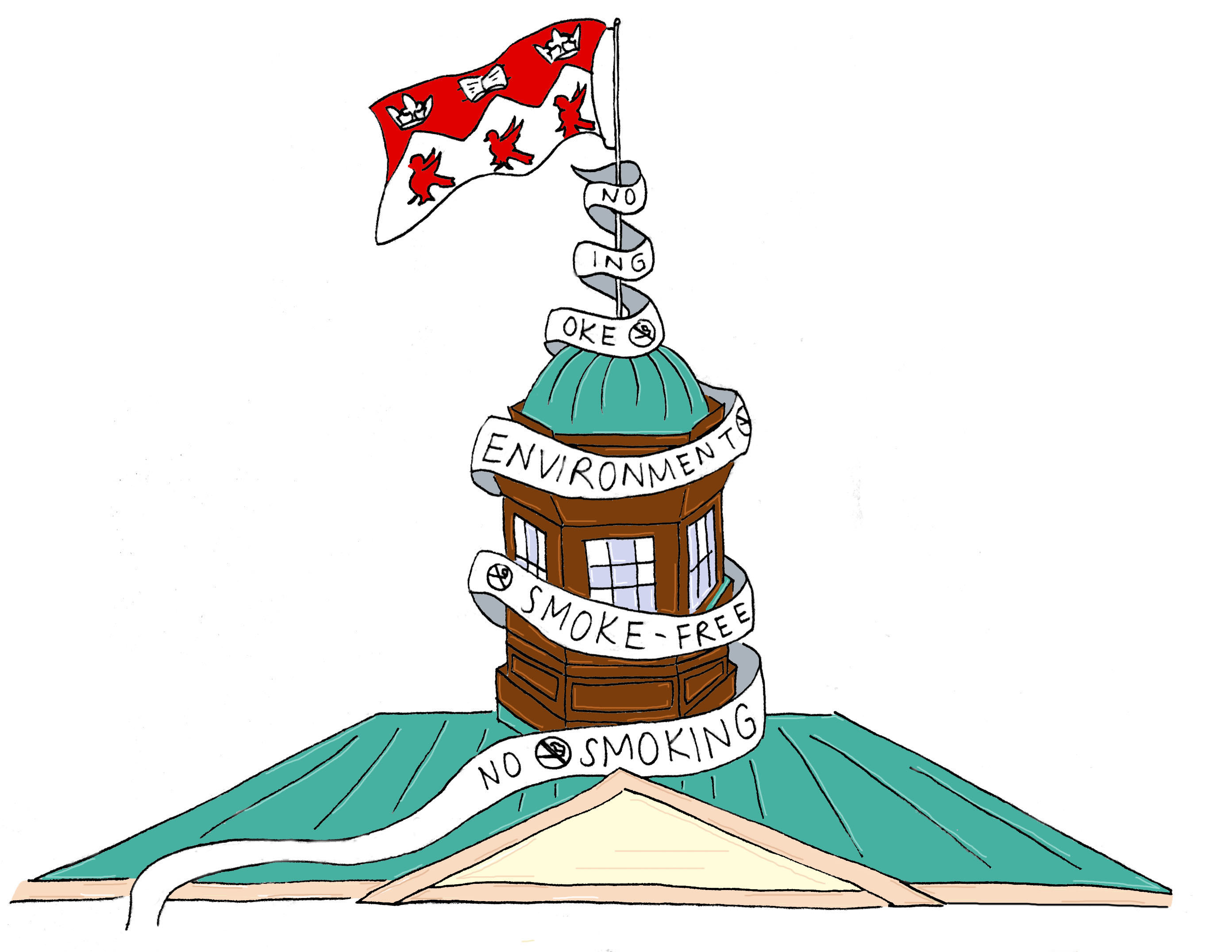The McGill Senate Smoking on Campus Working Group held a town hall meeting on Tuesday, Feb. 9 to discuss establishing a smoke-free campus. The meeting, led by Medicine Senator David Benrimoh, included a brief presentation of proposed smoking shelters as a solution to reducing secondhand smoke on campus, followed by an open discussion.
“The purpose of this town hall was to get as many people as possible to talk about […] smoking in general on campus and our approach to that,” Benrimoh said. “What we’re talking about today is the right to smoke everywhere—so not the right to smoke, not whether smoking is evil or good, not any of those things—just in our community, [and] on our campus: How do we want to manage people’s right to smoke in certain places for reasons of student health and wellness?”
According to Benrimoh, one such method of approaching the matter is education.
“We want to work with partners like Healthy McGill to address the things that make people smoke or the things that [make] it harder to quit smoking on a university campus,” Benrimoh said. “So things like stress, […] social smoking […], weight loss, and other university-specific causes.”
Another part of the proposal focused on providing resources for smokers who may be interested in quitting. If McGill does choose to implement such a policy, the university would offer cessation resources and services to current smokers. These services are also being considered as alternatives to a smoke-free campus.
“We’re actually meeting with Health Services […] later next month to discuss what kind of services they’d be able to offer,” Benrimoh said. “We’re not expecting everyone to want to quit tomorrow, but maybe some people want to reduce, some people want to quit, some people don’t know [or] want to think about it; we want to cover that broad range.”
Another possibility is the construction of smoking shelters around campus. If built, the shelters would become the only areas on campus where smoking would be permitted. Currently, the university policy follows provincial law, which prohibits smoking within nine metres of building entrances.
“The idea is to create a place to smoke that’s out of the cold, that’s convenient, that’s close to people who already smoke, but that would sort of isolate the smoke from people who don’t want to get secondhand smoke,” Benrimoh explained.
In a survey distributed in faculty listservs in the weeks preceding the town hall meeting, over 600 students shared their thoughts on the topic of smoking on campus. While the majority seemed to be in favour of smoking shelters, the survey saw varying opinions towards smoke-reduction in the comments section.
“An outright smoking ban across the entire campus would be [heavy-handed],” read one comment. “[The university] should keep in mind that smoking is addictive and forced withdrawal has negative consequences for smokers (thereby making it harder for them to study). The smoking shelter idea sounds promising.”
One student smoker left a comment speaking out against the campaign for a smoke-free campus.
“School is stressful,” reads the comment. “I like smoking cigarettes. Don’t take that away from me. The campus is large, and making it entirely smoke free would be a huge inconvenience for people who want to smoke, especially after dark. Who is standing around inhaling second degree smoke in the winter? Seriously, if I can buy cigarettes I should be able to smoke them. It’s my campus, too.”
Ultimately, according to Benrimoh, as well as other members of the working group, what this initiative lacks are the voices and opinions of smokers on campus. There were almost no smokers present at the town hall, despite the group’s best efforts to attract them to the meeting. “We’re really trying to get smokers to give their opinion,” Benrimoh said. “It matters to us.”
Arts Senator and member of the Smoking on Campus Working Group, Erin Sobat, agreed that one of the working group’s main goals moving forward would be to obtain more feedback from smokers.
“This was the first of several consultations to hear from students on this issue,” Sobat said. “We had a good discussion with those who came, but definitely need to reach out to more smokers themselves. Our priority is finding ways to reduce student exposure to secondhand smoke while developing a more supportive environment for students who want to quit or cut down. Transitioning to a smoke-free campus is one option, but one we would only pursue with more effective cessation and support resources in place.”









I quit smoking almost 15 years ago. It had been difficult but I just kept telling myself I will never light or smoke the next smoking. We tried all sorts of things in the number of attempts I made before success. We had been so tired of smoking, I was coughing my head down one morning and I also did perhaps not ( could not) smoke all day long.
But we recommended this book. it is acutely intriguing and is a browse that is great it does additionally provide a lot of tips about what you can fight any quitting smoking. It has actually assisted my older sis inside her battle with diabetes It should be on google. Have a look for CHARLES JACKSON QUIT SMOKING PROGRAM to have the book I mentioned.
I really like all of the points you have made.